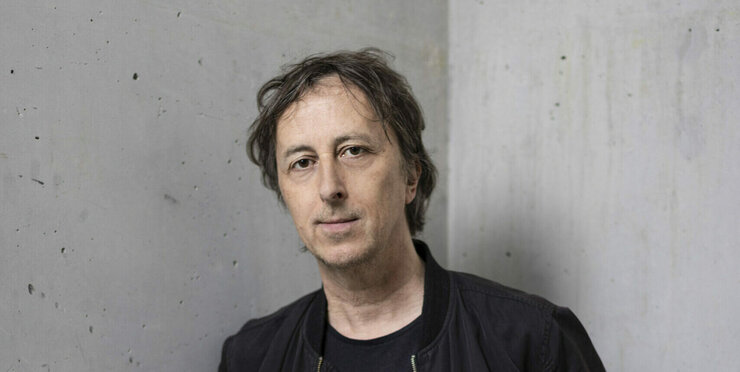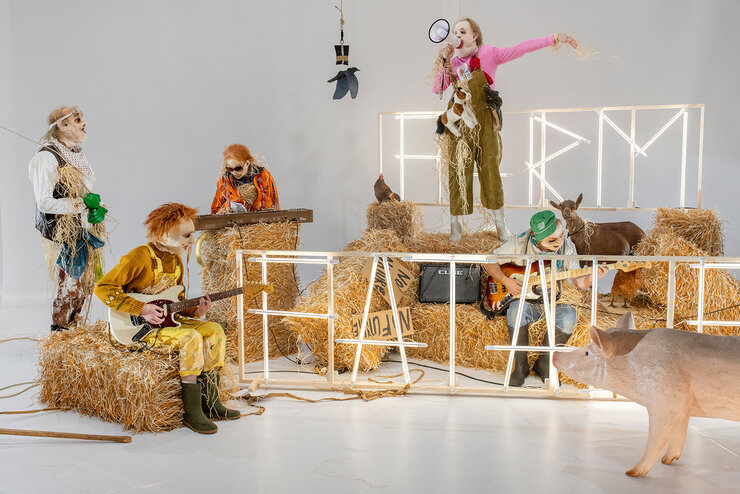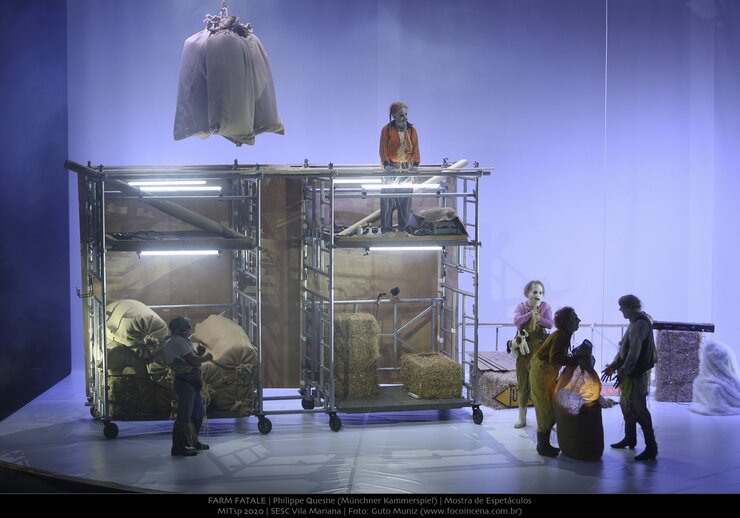
With «Farm Fatale», French theatre-maker Philippe Quesne presents a quiet yet subversive climate fable at the Zürcher Theater Spektakel. Originally from the visual arts, Quesne develops his work in collaboration with his long-standing company, Vivarium Studio, with whom he has been creating idiosyncratic, visually striking stage performances for over 20 years. In this interview with dramaturge Lea Loeb, Quesne discusses his ecological theatre practice, the potential of the imaginary and the need to slow down in an accelerated world.
First of all, thank you so much for taking the time to speak with us. We’re thrilled to be able to present your work in Zurich next week, during the festival’s opening weekend! Ecology, the extinction of species, and the relationship between humans and non-humans are central themes in your work. What role do these play in your creative process?
My interest in all things alive goes back to my childhood. I was fascinated by animals and insects. When I started creating stage environments, the idea of different species coexisting felt like a natural one. My first piece, «La Démangeaison des ailes», explored humanity’s desire to fly. Soon, animals were appearing on stage – a dog, an actor dressed as a bird… Over the years, I’ve developed a «multi-species theatre»: moles, giant squids, scarecrows... At first, this wasn’t present in the French theatre scene. In 2006, «D’après Nature» was created, an ecological fairy tale about astronauts tasked with repairing the ozone layer – back then, these themes, if at all, were only found in the visual arts.
The encounter with Bruno Latour and other thinkers who have shaped the concept of the Anthropocene has had a profound influence on my work. I didn’t even know that my creations were being acknowledged in these circles. Their ideas have opened up new perspectives for me. Sometimes ecology is at the heart of it, as in «Farm Fatale», other times it appears more poetically – but it is always there.
Can you describe what the encounter with Bruno Latour and the subsequent collaboration inspired in you?
Latour, Haraway and many others have bridged science and art, thus changing our worldview. This has inspired many artists. I had invited Latour and his team for a nearly seven-year residency at the Théâtre de Nanterre, which I was running at the time. Together with students from Sciences Po, we created «Le Théâtre des négociations», a simulated climate conference in collaboration with Raumlabor – even before COP21, almost like a «grand documentary event». Since my early works, I’ve been striving to create theatre where an ecosystem can be observed live and where the relationships between humans and non-humans are questioned. The stage designs have always been landscapes in their own right.

Since «Farm Fatale», which premiered in Munich in 2019, the climate crisis, as well as the extinction of species, have reached a tipping point. Has your perspective on the piece changed?
Yes, I didn’t foresee the pandemic when devising the piece, although the characters wear masks. Since then, the environmental crisis has intensified: air quality, agriculture, food... All of this is linked to current geopolitical conflicts and rampant capitalism.
«Farm Fatale» deals with species extinction, told through the perspective of scarecrows. My works have become darker since then, even though I still maintain a sense of humour. Even the moles in «La Nuit des taupes» (2016) were survivors. Today, fear is omnipresent – between billionaires' bunkers, Mars colonies, and apocalyptic fantasies... I’m not very optimistic. We’re no longer in the phase of warning, but right in the midst of upheaval.
And yet, your pieces offer a kind of refuge. Despite the impending apocalypse, we are drawn to immerse ourselves in these worlds.
Yes, I like the idea of theatre as a refuge. A shared, living space. After the pandemic, the audience has returned with great energy. I try to create theatre that allows room for doubt, daydreams, and alternative paths – like an evening around a campfire. Even when I use real facts, as in «Farm Fatale», I avoid pure documentary theatre. I need poetic distance and the possibility for interpretation.
Art will not save the world, but it remains indispensable for our humanity. Especially now, when the right to individual thought and imagination is under threat. What has pleased me in recent years is the productive exchange between art, science, and philosophy. Feminist theories, authors writing about decoloniality, as well as new leftist movements, are enriching this discourse. Even if it’s politically difficult to grasp: perhaps from this, future utopias will emerge that can change the world.
And yes, refuge is exactly what I want to offer: a shared space for thinking and dreaming. A moment of calm where everyone can take a breath. Even though my pieces are based on facts – for example, «Farm Fatale» addresses farmer suicides, genetic engineering, and pesticides – I need the poetic distance. Documentary theatre in the strict sense is not my thing.
Art is unlikely to save the world, but it is central to human existence. The right to free thought and to poetry is now under threat – in education and politics. Capitalism favours compliant artificial intelligences over critical, creative humans. We urgently need new narratives, different stories, new utopias. For fear has become a strategy of power: stirring fear, creating insecurity, gaining control – this is not a new pattern. But there is one final space of resistance: imagination. We must imagine new stories, think of new systems, and alternative power structures.
When I think back to my childhood, to those experimental schools with animals, I’m repeatedly reminded of how often animals are the true heroes in children’s stories: hares, wolves, beavers, birds... They stand for something else, offering real alternatives.
This need for transformation is strong in childhood. But it often disappears in adolescence, as if adulthood equals seriousness, «real» work. The imaginary is systematically cut back. No coincidence. In fact, it seems that neoliberalism wants to cut back exactly this human dimension: the right to dream. That’s why I make theatre in which scarecrows build radios, moles sing operas, and even «pests» make music. That’s my form of resistance.
I am currently working on a piece about vampires in Hamburg. I love genres: fantasy, fairy tales, science fiction... In 2021, I directed «Fantasmagoria» – «abandoned pianos», with no actors at all. It sounds sad, but even object theatre can invite to dream and explore new paths.

Another distinctive feature of your work is your approach to time. Your pieces are often slow, contemplative, and quiet. Is this a form of resistance against the acceleration of the world? A counterproposal to the economy of fear?
Yes, definitely. Gentleness and calm are essential for my work. I don’t stage classical tragedies; violence is not a driving force in my dramaturgy. Calm creates trust, listening, empathy. This slowness is an invitation: to be together, in a different rhythm. And this slowness makes visible how theatre is created: how an image forms, a space arranges itself, a landscape changes. In «Le Jardin des Délices», for example, you see a group of people moving in and around a large bus, set in the middle of a desert landscape. There is little chaos in my work, hardly any fights or murders – this is a conscious decision. It’s a form of deceleration. Paul Virilio once said: We need to slow down the planet. This idea has shaped me. Since the industrial revolution, we’ve been racing forward – ever faster, farther, more profit-driven. A collective intoxication.
I sometimes see myself as a Neo-Romantic. In Munich, I directed a piece inspired by Caspar David Friedrich. A look back at the end of the Romantic era, when people still gazed at the fog, before coal, electricity, and machines sped everything up. Theatre allows us to pause. To see heroic moles, singing scarecrows. Things that are rarely possible in real life, but become real on stage. And they matter.
To conclude, a structural question: What about the ecology of theatre itself? International festivals, in particular, often rush from novelty to novelty. What are your thoughts on this?
«La Mélancolie des dragons» will soon be 20 years old. That’s rare in theatre. Usually, it’s about the new, the current, the question: «What is he doing this year?» But some works have a lasting resonance. And that’s also ecological: no culture of disposable art. Producing a piece for two performances and then discarding it – that’s absurd. Artists like Pina Bausch, Maguy Marin, and Bob Wilson have defended repertory work. That’s precious. And I’m glad that your festival allows for this continuity.
I have been working for a long time with a core group of collaborators. Not a company in the classical sense, but a stable ensemble. The actor Gaëtan Vourc’h has been with me since my first piece, and today he also performs in «Farm Fatale». Sébastien Jacob has been part of the team since 2003. Sometimes someone is replaced, like in an orchestra. The original cast of «Farm Fatale» was formed in Munich, and its roles have been passed on. I like that: works that are carried forward and transformed. I also pay attention to recycling my set designs and props: the car prop from «La Mélancolie des dragons» has appeared in three productions. Masks and spotlights in «Farm Fatale» are partly from the 70s and 80s. Brigitte Frank from the mask department at Münchner Kammerspiele gave me old masks, which we adapted for our actors.
In «Farm Fatale», I sought this distance: the actors, looking somewhat like nostalgic rag dolls, addressing serious issues in a different way – pollution, pesticides, soil erosion... We are part of a chain of ethical decisions, not just aesthetic or political ones. Working with the same people is also a no to constant castings, to the pressure for novelty. Ecology is not only about nature. It forces us to question our artistic practices as well.
Artists such as Bob Wilson and Pina Bausch have made theatre history with enduring works. Maguy Marin has been touring with her Beckett-inspired piece «May B» for 40 years. Likewise, Miet Warlop, Marlène Monteiro Freitas, Gisèle Vienne, Boris Charmatz – all of them continue to develop their gestures over the years. This is also a form of ecology. We need continuity, reflections, to understand what becomes of artistic works. I hope we also find new ways of touring. It’s not flying that troubles me – but the pressure to «discard» good and important works just because they are no longer brand new.
Credits
Interview: Lea Loeb
The interview was conducted in French.
Translation into German: Lea Loeb
Translation into English: Franziska Henner
Portrait photo:@Amelie Blanc
Photos from Farm Fatale: @Patrick Berger, @Guto Muniz (www.focoincena.com.br)